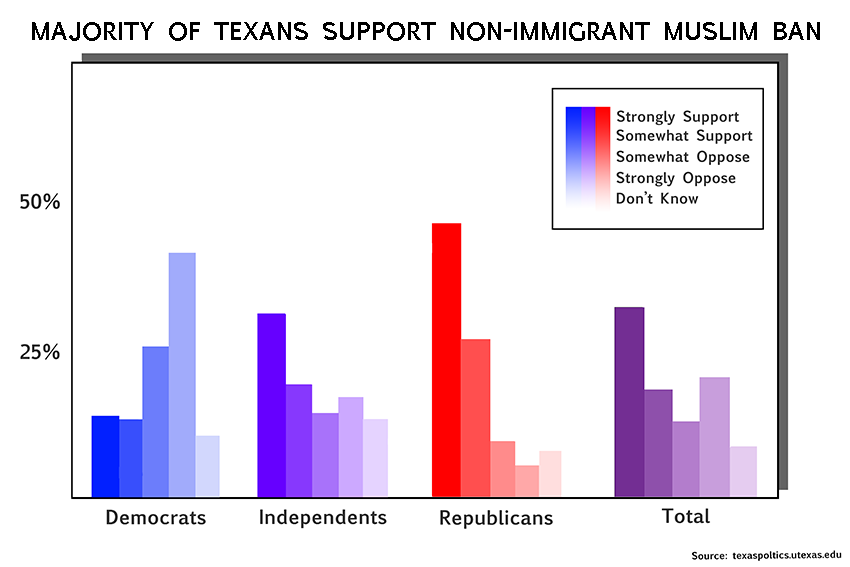If a majority of voters support a policy, should legislators cave to loud opposition from the other side? It is true that all of our voices should be represented by our legislators, but what are they to do when forced with a decision between ethical policy-making and representing the general will?
That is the question Texas legislators face after opposition to President Donald Trump’s travel ban executive order erupted all over the state. As a slight caveat, let me offer some clarification on the order itself. It does prohibit all refugees from entering the United States for 120 days, it does indefinitely ban Syrian refugees and it does suspend the entry of all immigrants and visa holders from seven majority-Muslim nations for 90 days. It does not place the 90-day restriction on any majority-Muslim nation where Trump has business ties. Finally, it does not place the 90-day restriction on any country that has ties to post-9/11 terrorist attacks on U.S. soil.
If the executive order seems brash and not narrowly-tailored, that’s because it is. If the restrictions seem ill-suited to stop the actual terrorism we face from home-grown extremists, that’s because they are. Simply, the order is bad policy — even if we believed that all Muslims should be banned from entering the United States. On top of that, judges say that the executive order is likely unconstitutional.
As such, protests against the detention of the aforementioned groups arose at several airports in Texas over the weekend. Indubitably, these Texans oppose the policy, but they may not be the majority of Texans. According to a UT/Texas Politics Project poll of Texans from last June, 52 percent of Texans support a blanket ban on non-citizen Muslim immigration to the United States.
This raises a hard question for Texas lawmakers. Should they pass a bill defying or condemning the president’s executive order, which the courts have already established as ineffective and unconstitutional? Or should the legislators vote with their majority and leave the ban alone? Perhaps still they should pass a law allowing immigration in the state. It would not be the first time a state has defied the federal government.
This is not a question I believe I can answer, but it is one we should collectively discuss. Do we let our society be run by the majority, who clearly favor policy that is at odds with the U.S. Constitution — or do we directly violate our core beliefs in overturning the policies that violate them? Again, I cannot say for sure what the answer to these questions may be, but I can conjecture: If the majority will be subverted only once, it may be to overcome the effectual and constitutional ignorance embedded in the president’s executive order. John Adams, the second president and famous champion of centralized government, echoed this sentiment when he said that Congress should be a “portrait of the people at large” that reaches outcomes upon “reason” and deliberation — perhaps that’s the vein of thought we should pursue.
It is of course possible that we have a collective answer — one that we can only arrive upon if we contemplate this ethical dilemma. Should Texans urge their lawmakers to pass HR 220, and similar legislation, or do we let our state’s majority guide policy? If the former, our morals may be in check. If the latter, we risk admitting we are not a true democracy.
G. Elliott Morris is a government, history and computer science junior. He is a senior columnist. Follow him on Twitter @gelliottmorris.





















